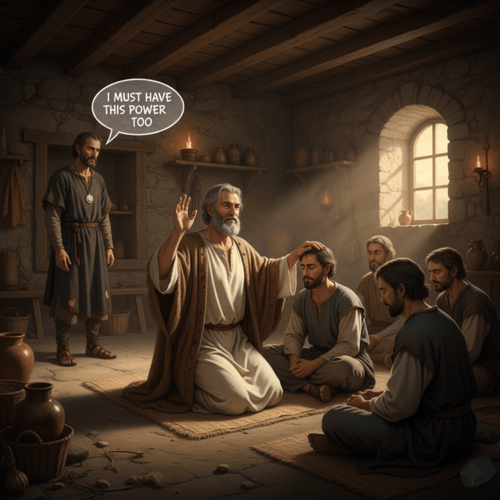Simon Magus: Unregenerate? Or Backsliding Believer?
In Acts 8, we encounter one of the New Testament’s most puzzling figures: Simon the sorcerer. After apparently believing the gospel and being baptised, Simon immediately attempts to purchase the Holy Spirit’s power with money. Peter’s response is devastating: “You have neither part nor lot in this matter, for your heart is not right before God.”
The question that has divided interpreters for centuries is this: Was Simon a genuine believer who fell into grievous sin, or was he never truly converted to start with? Clearly, both views can’t be right. Which one is wrong?
SIMON AS UNREGENERATE
The strongest arguments for viewing Simon as never genuinely saved come from the nature of his response, and from the unsparing assessment from Peter—the other Simon.
Peter’s verdict is damning. When the apostle tells Simon “you have neither part nor lot in this matter,” he’s using covenantal language that echoes Old Testament passages about being excluded from God’s people (Deuteronomy 12:12; Joshua 22:25). This isn’t the language of a pastor correcting a wayward believer—it’s the language of declaring someone outside the covenant community entirely. Peter sees into Simon’s heart and declares it fundamentally “not right before God.”
The call to repentance suggests the need for initial conversion, not restoration. Peter commands Simon to “repent of this wickedness” and notes that he is “in the bond of iniquity” (Acts 8:22-23). That phrase—”the bond of iniquity”—is particularly significant. It suggests Simon remains enslaved to sin, still bound by chains that Christ came to break. This is the language of someone who has never experienced genuine liberation, not someone who has temporarily stumbled.
The nature of Simon’s “belief” may have been superficial. While Acts 8:13 states Simon “believed,” Scripture elsewhere acknowledges not all belief is saving belief. James 2:19 reminds us “even the demons believe—and shudder!” Jesus Himself warned some would believe “for a while” but fall away when tested (Luke 8:13). Simon may have experienced intellectual assent—agreeing the gospel was true—without the heart transformation that constitutes genuine conversion, or regeneration (being “born again”).
His motivations remained corrupt. What’s striking about Simon’s sin isn’t just that he sinned—all believers do—but that his sin revealed utterly unchanged desires. He wanted spiritual power for personal gain and glory, the same motivation that had driven his sorcery. A regenerate heart, transformed by the Holy Spirit, produces new desires and affections (2 Corinthians 5:17). Simon showed no evidence of this transformation.
We see no genuine repentance. When confronted, Simon merely asks Peter to pray for him “that nothing of what you have said may come upon me” (Acts 8:24). This sounds more like fear of consequences than godly sorrow over sin. There’s no acknowledgment of wrongdoing, no confession, no evidence of a broken and contrite heart. The text leaves Simon’s spiritual state unresolved, which itself may be Luke’s way of signaling Simon never truly belonged to Christ’s flock.
THE CASE FOR SIMON AS A GENUINE BELIEVER IN TEMPORARY SIN
Despite these powerful arguments, respected interpreters do still see Simon as a genuine, if severely compromised, believer.
- The text explicitly states Simon believed and was baptised. Acts 8:13 uses the same language to describe Simon’s conversion as it uses for other believers throughout Acts: “Simon himself believed, and after being baptised he continued with Philip.” If we take Luke at his word, Simon experienced the same outward markers of conversion as the Samaritans whose faith we don’t question. To claim Simon wasn’t truly saved requires us to add qualifications Luke himself doesn’t include.
- Peter addresses Simon as someone capable of repentance. Critically, Peter doesn’t tell Simon to “get saved” or “believe the gospel.” He tells him to “repent” and says “perhaps the thought of your heart may be forgiven you” (Acts 8:22). This is the language of restoration, not initial conversion. Peter treats Simon as someone within the covenant community who has sinned grievously and needs to turn back to God—much as the prophets called wayward Israel to repentance.
- Simon’s request for prayer suggests some genuine faith. When Simon asks, “Pray for me to the Lord,” he demonstrates at least some recognition that intercession matters and that Peter has access to God he lacks. While this could be mere superstition, it could also indicate a weak but genuine faith reaching out for help in a moment of crisis.
- Scripture is full of genuine believers who sinned terribly. David committed adultery and murder. Peter denied Christ three times. The Corinthian believers were engaging in lawsuits, sexual immorality, and divisions. Yet none of these are presented as evidence of false conversion. If we see Simon as unregenerate based solely on the severity of his sin, we risk creating an impossibly high standard that would disqualify many biblical believers.
- Early church tradition was divided. While this doesn’t settle the matter, the fact that respected church fathers disagreed about Simon’s status suggests the text’s inherent ambiguity. If the answer were obvious, we’d expect more consensus.
WHY THE REFORMED CONSENSUS FAVOURS THE “UNREGENERATE” VIEW
Reformed theologians—including contemporary voices like John Piper, RC Sproul and Kevin DeYoung—have generally concluded Simon was never genuinely saved. This consensus flows from several core Reformed convictions.
The doctrine of perseverance of the saints is central. Reformed theology teaches that those whom God genuinely saves, He keeps. Jesus promised, “My sheep hear my voice, and I know them, and they follow me. I give them eternal life, and they will never perish, and no one will snatch them out of my hand” (John 10:27-28). 1 John 2:19 addresses those who left the church: “They went out from us, but they were not of us; for if they had been of us, they would have continued with us.” Simon’s apparent apostasy suggests he never truly belonged to Christ.
Reformed theology emphasises the transforming nature of regeneration. When the Holy Spirit regenerates someone—brings them from spiritual death to life—He creates new desires, new affections, and a new trajectory of life. John Calvin distinguished between “temporary faith,” which produces outward conformity but no heart change, and “saving faith,” which transforms from the inside out. Simon’s unchanged heart, still captivated by the desire for power and glory, suggests he experienced only the former.
God’s assessment trumps human judgement. Through Peter, the Holy Spirit inspired an authoritative evaluation of Simon’s spiritual state. When God Himself, speaking through His apostle, declares someone’s heart “not right before God,” Reformed interpreters believe we should take this assessment seriously rather than softening it with speculation about what might have been in Simon’s heart.
Pastoral wisdom counsels against false assurance. Piper, Sproul, and others have emphasised one of Satan’s most effective weapons is false assurance—convincing people they’re saved when they’re not. The Reformed tradition has historically erred on the side of calling people to examine themselves and ensure they’re “in the faith” (2 Corinthians 13:5) rather than offering cheap comfort to those whose lives show no evidence of regeneration. Better to question a false convert’s assurance than to leave them comfortable in their lostness.
The pattern fits Acts’ broader narrative. Luke repeatedly contrasts genuine and false faith throughout Acts. Ananias and Sapphira were part of the church but were judged for their hypocrisy. The seven sons of Sceva attempted to use Jesus’ name without knowing Jesus Himself. Simon fits this pattern of those who associated with the church and Christian power without experiencing genuine heart transformation.
CONCLUSION
The case of Simon Magus remains one of Scripture’s most debated interpretive questions precisely because the text doesn’t resolve his story definitively. We don’t know if he repented. We don’t know his eternal destiny. What we do know is his case serves as a sobering warning: baptism, church attendance, and even apparent belief don’t guarantee genuine conversion.
Perhaps the ambiguity itself is the point. Rather than arguing endlessly about Simon’s soul, we should examine our own hearts. Are we trusting in outward religious acts? Or have we experienced the genuine heart transformation that only the Mighty Spirit brings?
Simon’s story ultimately points us beyond theological debate to personal examination. In the words of 2 Corinthians 13:5: “Examine yourselves, to see whether you are in the faith. Test yourselves.” May we all heed the counsel. And may God grant us genuine hearts that are truly right before him.
SIMON MAGUS: UNREGENERATE OR BELIEVER?—RELATED FAQs
How did the early church fathers view Simon Magus? The early church was divided on Simon’s salvation but united in viewing him negatively. Justin Martyr and Irenaeus claimed Simon became the father of all heresies and founded a Gnostic sect, though these accounts are likely legendary. Others like Origen leaned toward viewing him as unregenerate, while some saw him as a cautionary tale of a believer’s potential fall. The lack of patristic consensus actually reinforces how ambiguous Luke left Simon’s final spiritual state.
- How do Arminian theologians typically interpret Simon’s case? Arminian scholars, who believe genuine Christians can lose their salvation, more readily see Simon as a true believer who apostatised. They point to the clear statement that he “believed and was baptised” and argue Peter’s call to repentance implies Simon had been in a state of grace but fell away. For Arminians, Simon becomes evidence that salvation can be forfeited through persistent, unrepentant sin. This interpretation aligns with their broader theological framework that emphasises human free will and the possibility of falling from grace.
- Why does Peter say Simon’s forgiveness is only “perhaps” possible? The word “perhaps” (Greek: ei ara) has puzzled interpreters for centuries. Some see it as Peter expressing doubt about whether Simon will actually repent, not whether God can forgive him. Others interpret it as emphasising the severity of Simon’s sin—attempting to commercialise the Holy Spirit’s gifts struck at the heart of the gospel’s free grace. Reformed interpreters tend to see the “perhaps” as Peter’s pastoral uncertainty about whether Simon possessed saving faith at all, making genuine repentance questionable.
What is the “sin unto death” in 1 John 5:16, and could it apply to Simon? 1 John 5:16 mentions a “sin that leads to death” for which John doesn’t instruct believers to pray. Interpretations vary widely: some see it as a specific sin (like blasphemy against the Holy Spirit), others as persistent, unrepentant apostasy that reveals false conversion. Simon’s sin—attempting to buy God’s power—could fit this category, especially given Peter’s severe response. However, John doesn’t specify what this sin is, leaving the connection to Simon speculative but provocative.
- Did any major Reformed theologians view Simon as a genuine believer? While the Reformed consensus leans heavily toward viewing Simon as unregenerate, some Reformed voices have expressed uncertainty or allowed for the possibility he was genuine. Matthew Henry’s commentary suggests Simon may have been a true believer who fell into “a great sin” but doesn’t definitively settle the question. However, the overwhelming majority of Reformed systematicians—following Calvin’s framework of temporary versus saving faith—conclude Simon exhibited only temporary faith without regeneration.
- What does “neither part nor lot in this matter” mean in its biblical context? This phrase echoes Old Testament covenant language about belonging to God’s people. In Deuteronomy 12:12 and Joshua 22:25, having “no portion” meant being excluded from Israel’s inheritance and blessings. Peter is essentially declaring that Simon has no share in the apostolic ministry, the Holy Spirit’s gifts, or—most seriously—in the salvation those gifts authenticate. It’s exclusionary language that places Simon outside the boundaries of God’s covenant community, which is why it weighs so heavily in the “unregenerate” interpretation.
How does Simon’s case relate to the modern “prosperity gospel”? Simon’s attempt to purchase spiritual power for personal gain eerily foreshadows modern prosperity teachings that commodify God’s blessings. Like Simon, some prosperity preachers often seek God’s power not for His glory but for personal wealth, influence, and acclaim. The term “simony”—buying or selling church offices or spiritual privileges—was coined from Simon’s name and became a medieval church scandal. His story remains a timeless warning against treating God’s gifts as merchandise or viewing ministry as a path to personal enrichment rather than sacrificial service.
SIMON MAGUS: UNREGENERATE OR BELIEVER?—OUR RELATED POSTS
- Battling Recurring Sin: What Sanctification Looks Like in Real Life
- Can Repentance be Real If We Struggle With Habitual Sin?
- When God Gives Us A New Heart: How Grace Rewires Our Desires
- Saints and Sinners: Why Does the Bible Use Both Terms for Christians?
- The Christian Heart: Is It Still ‘Desperately Wicked’?
Editor's Pick

Paul’s Teaching on Women’s Roles: 1 Timothy 2:12 Explained
YARBROUGH’S BIBLICAL CASE FOR COMPLEMENTARIANISM In a world of shifting cultural values, few biblical texts generate as much discussion as [...]

What Does the Bible Really Mean By ‘The Flesh’?
8The phrase "the flesh" appears over 150 times in the New Testament, making it one of the most significant theological [...]

Does God Still Talk Directly To His People?
"God told me to take this job." "I feel the Lord leading me to marry her." Such phrases echo through [...]

Will There Be a Third Jewish Temple in Jerusalem?
Throughout history, God's dwelling among His people has taken several forms—from the wilderness tabernacle to Solomon's magnificent temple, to its [...]

Filled Vs Baptised With the Spirit: What’s the Difference?
Filled vBaptised with the Holy Spirit vs. filled with the Spirit: are these simply different terms for the same spiritual [...]

Joshua & Yeshua: Exploring the Name and Life Connections
When we encounter names in Scripture, they often carry profound theological significance. None more so than the name shared by [...]

Can Evil Spirits Read Minds? What Scripture Actually Teaches
Ever worried Satan or his demons can see your thoughts? Perhaps you’ve had a sinful thought and immediately felt exposed, [...]
Does a Husband’s Faith Save His Family? Acts 16:31 Explained
"Believe in the Lord Jesus, and you will be saved, you and your household." This promise in Acts 16:31 has [...]

Did Jesus Die Too Soon? Was Pilate’s Surprise Unfounded?
Sceptics point to Jesus' relatively short time on the cross as evidence the Gospel accounts are unreliable. After all, when [...]

Shouldn’t the Book of Enoch Be In the Bible? Why Isn’t It?
The Book of Enoch has fascinated scholars, theologians, and curious readers for centuries. Mentioned in the New Testament and revered [...]
SUPPORT US:
Feel the Holy Spirit's gentle nudge to partner with us?
Donate Online:
Account Name: TRUTHS TO DIE FOR FOUNDATION
Account Number: 10243565459
Bank IFSC: IDFB0043391
Bank Name: IDFC FIRST BANK







